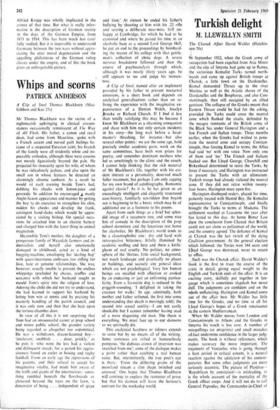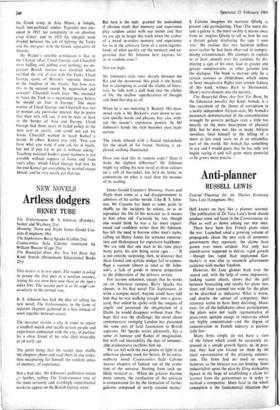Turkish delight
M. LLEWELLYN SMITH
The Chanak Affair David Walder (Hutchin- son 50s)
in September 1922, when the Greek army of occupation had been expelled from Asia Minor and the city of Smyrna had gone up in flames, the victorious Kemalist Turks turned north- -wards and came up against British troops at Chanak, a little town on the Dardanelles. Kemal demanded Thrace up to the river Maritza as well as the Asiatic shores of the Dardanelles and the Bosphorus, and also Con- stantinople, then still occupied by an allied garrison. The collapse of the Greeks meant that Eastern Thrace could be had for the asking, provided the Turks could cross the neutral zone which flanked the straits, defended by the meagre remnants of the British army of the Black Sea under General Harington and a few French and Italian troops. Three months earlier, when the Greeks had wished to pene- trate the neutral zone and occupy Constan- tinople, thus forcing Kemal to terms, the Allies had said 'no' with one voice. Now only one of them said 'no.' The French and Italians backed out. But Lloyd George, Churchill and Birkenhead determined to resist the Turks, by force if necessary, and Harington was instructed to present the Turks with an ultimatum. Turkish troops had already violated the neutral zone. If they did not retire within twenty- four hours, Harington must open fire.
Harington disobeyed orders, played for time, patiently treated with Hamid Bey, the Kemalist representative in Constantinople, and finally brought the Turks to terms at Mudania. The settlement reached at Lausanne the year after has lasted to this day. At home Bonar Law drew the conclusion from Chanak that Britain could not act alone as policeman of the world, and the country agreed. The defiance of Kemal at Chanak was the last twitch of the dying Coalition government. At the general election which followed, the Tories won 344 seats and Libyd George was destroyed, never to return to office.
,Such was the Chanak affair. David Walder's book is the first to trace the course of the crisis in detail, giving equal weight to the English and Turkish ends of the affair. It is an exciting story, skilfully put together in lan- guage which is sometimes slapdash but never dull. The judgments are confident and on the whole unflattering. Harington and Kemal come out of the affair best. Mr Walder has little time for the Greeks, and no time at all for Lloyd George's hopes of a Greek renaissance ii theeastern Mediterranean.
When Mr Walder moves from London and Constantinople to Athens and the Greeks in Smyrna his-touch is less sure. A number of misspellings (or misprints) and small mistakes 4Afact undermine confidence in the larger judg- ments. The book is without references, which makes accuracy the more important. The treatment of Venizelos, who is going through a lean period in critical esteem, is a natural reaction against the adulation of his contem- poraries. But some other judgments are more seriously eccentric. The picture of Plastiras- 'Republican by conviction'—is misleading, as is the whole account of the mentality of the Greek officer corps. And it will not do to call General Papoulas, the Commander-in-Chief of the Greek army in Asia Minor, a 'simple, loyal, non-political' soldier. Papoulas was exe- cuted in 1935 for complicity in an abortive coup d'etat; and in 1921 his energies were divided between the job of fighting the Turks and his intrigues with the Greek separatists of Smyrna.
Mr Walder's sensible conclusion is that in the Chanak affair Lloyd George and Churchill were huffing and puffing over nothing; no im- portant British interest was involved which justified the risk of war with the Turks. Lloyd George spoke of Britain's 'su'preme interest in the freedom of the Straits,' but how was this to be secured except by negotiation and consent? Churchill wrote later, 'We intended to force the Turk to a negotiated peace before he should set foot in Europe.' The main motive of Lloyd George and Churchill was not to protect any particular interest, but to prove that their writ still ran, if not in Asia, at least to the border of Asia and Europe. Lloyd George had three years of failed policy in the near east to justify, and could not cut his losses. Churchill wanted to teach Kemal a lesson. In effect, Kemal was told, 'You can have what you want if you ask for it nicely, but not if you try to get it without asking.' Teaching national leaders good manners is not possible without support at home and from one's allies, which Lloyd George had lost. In the end Kemal got everything he wanted except Mosul; and he very nearly got that too.



































 Previous page
Previous page